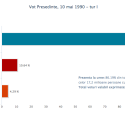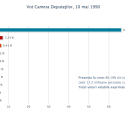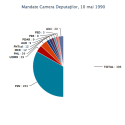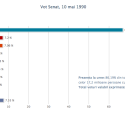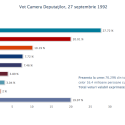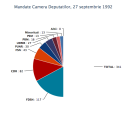IMPORTANT DEVELOPMENTS
- 1. Foreign policy. Prime Minister Victor Ponta is embarking on a visit to Germany and Slovakia
- 2. Foreign policy. Prime Minister Victor Ponta made a visit to Poland
- 3. Investments. Romania is Europe’s 10th ranked country in terms of jobs created by FDI
- 4. European funds. The Government has managed to double the European funds absorption rate
- 5. Legislation. SPD MPs plead for more flexible Constitution
- 6. Weather. The Cabinet takes all precautionary measures to prevent loss of life and property.
1. Victor Ponta’s Visit to Germany and Slovakia
Prime Minister Victor Ponta will be embarking on an official visit to Germany and Slovakia, at the invitation of the prime ministers of the two countries. The 10-11 June visit will see Victor Ponta meeting high officials in Berlin, Stuttgart and Bratislava for a series of talks, as well as for the conclusion of several high-profile economic contracts.
Victor Ponta will be received by German Chancellor Angela Merkel and Slovak Prime Minister Robert Fico. The Prime Minister will also have an intervention on the topic of the progressive path of Romania, during a “Friedrich Ebert” Foundation debate, followed by a visit to Stuttgart, where he will meet officials of the Daimler Company, which has recently announced a 300 million Euros investment in Romania. During his visit, Victor Ponta will also have talks with the President of Slovakia and the Prime Minister of Baden-Wurttemberg. The last visit of a Romanian prime minister to Germany occurred in 2006.
The visit is the concrete proof of the normalization of the relations between Romania and Germany and of the recognition of the popular vote the USL received last year. Prime Minister Victor Ponta is thus continuing a truly remarkable diplomatic “tour de force”: he has represented Romania at the European Council; he has met François Hollande in Paris. The Prime Minister has also made important visits to Denmark, Austria, Italy, Belgium, and Poland. The Prime Minister’s visit to Germany is also an expression of the country’s increasing political stability and economic expansion.
The main objective of the visit is the development of Romanian-German relations and increasing the level of German investment in Romania. The visit aims to strengthen the already strong economic and political ties between the two countries.
Germany is the third most important investor in Romania, after the Netherlands and Austria. German investments in 2012 were worth 6.2 billion Euros, whereas the level of commercial exchange has overpassed 17 billion Euros. No less than 19,768 companies owned by German capital are registered in Romania, worth 4.1 billion euros.
The Romanian Government wishes to attract more German investors, in order to continue creating jobs. “We highly encourage investment in Romanian energy sector, especially in hydropower and renewable energies. Greatest potential: industry, energy and infrastructure, agriculture, IT&C”, Prime Minister Victor Ponta declared. The Prime Minister also added that the improving political and economic conditions are an advantage for Romania “We still have enormous potential for intensifying our economic exchanges. The Government’s objective is to ensure a stable and predictable economic environment and to attract the foreign investors”.
The Prime Minister’s participation to the “Friedrich Ebert” Foundation debate will comprise an intervention on Romania’s current policies regarding the future of Europe and the economic policies for combating the crisis. “What we have put in practice, during our first year in government, is what we call a Romanian model of crisis management and post-crisis rebuilding. We have firmly rejected austerity and, at the same time, excluded the paradigm of careless spending and enlarging deficits,” Victor Ponta declared.
“Despite the financial crisis having also shaken Romania’s economy, the Social Liberal Union has been successful in rebooting the country’s economy, making it an attractive place for foreign investment and also reinstating social justice while keeping a well-balanced map of macroeconomic indicators and generating political stability”, the Prime Minister added.
Victor Ponta emphasized that “two elements are fundamental to my view of a European model: an EU-wide Social Progress Pact and a programme to tackle youth unemployment, both supported by the European Socialists”. The Prime Minister underlined that Europe must also avoid creating ”an EU of the rich and an EU of the less-rich, it cannot work like that. This union was created on the grounds of reducing disparities, of putting resources together in order to achieve common objectives more efficiently.”
2. Victor Ponta’s visit to Poland
Prime Minister Victor Ponta met Polish Prime Minister Donald Tusk. The main issues on the bilateral agenda were improving European funds absorption and the administrative reorganization of the country. Victor Ponta insisted on the importance of learning from the Polish experience on both accounts.
The Prime Minister emphasized that Poland and Romania share the same vision on the future of Europe and on the European agenda. Moreover, the Prime Minister underlined that the relations between the two countries are influenced by their common interest of discovering new energy source, in order to ensure the energetic independence of both states. Victor Ponta declared his confidence that his relationship with Prime Minister Donald Tusk will help strengthen the Polish-Romanian partnership.
3. Romania the 10th country in Europe in terms of jobs created by FDI in 2012
According to an Ernst&Young study, Romania is the tenth country in Europe and the fourth country in Central and Eastern Europe in terms of jobs created by FDI in 2012. Romania generated last year 7,114 jobs because of foreign investment, an 18.9% increase compared to the 2012 figures.
The positive Romanian trend occurred along within a general positive trend in Central and Eastern Europe, a region that is becoming increasingly attractive for international investors. Renault, for example, produces only a quarter of its automobiles in France, the rest of the output is produced in Romania, Turkey, Morocco, and Slovenia.
4. The Government has managed to substantially increase the absorption rate
The USL Government managed to double the absorption rate, up to 15.8%. The increase proves that the Government’s measures had a positive impact on the absorption process.
The result is even more impressive considering that some of the operational programs were suspended or undergoing suspension procedures, when the USL cabinet was sworn in, because of the 2009-2011 irregularities. Romania has managed to attract more funds during a year of USL government than during the whole period of the PDL cabinets. Government figures have expressed their confidence that the performances of Romania will only increase during the new Multiannual Financial Mechanism
5. PSD MPs call for more flexible Constitution
During the parliamentary debates on the amendments that should be brought to the Constitution, PSD figures expressed their conviction that the Constitution should comprise only the rights and the principles upon which the Romanian state is based. The Social Democrats pleaded in favor of a more efficient fundamental law that does not regulate any aspect of social interaction, but leaves enough space for organic laws.
The Social Democrats considered that no amendments should be brought to the current provisions regarding marriage. In their opinion, a simple amendment of the Family Code is needed in order to regulate the provisions regarding family right sand benefits.
6. Flooding Risks
Prime Minister Victor Ponta convened the Commandment for combating floods and ensuring prevention measures, in order to ensure that central and local authorities are taking all steps in order to prevent harmful effects, given the weather warnings.
Even though specialists sustain that Romania will not suffer the same dire effects as the other Danube states, the Government is taking all precautions to protect the people’s life and property. Prime Minister Victor Ponta also made an appeal to the local authorities to step up their efforts. The Government also contacted Hungarian officials in order to offer Romania’s assistance.



